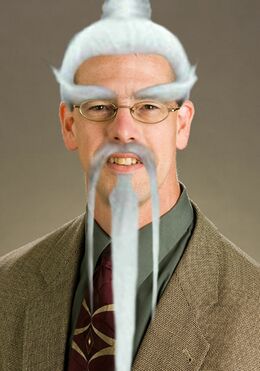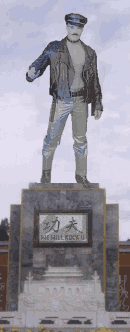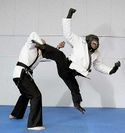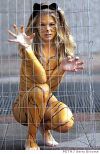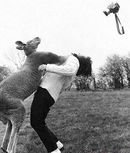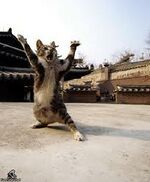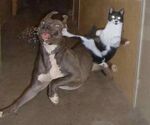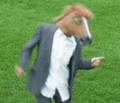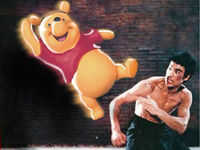Kung Fu
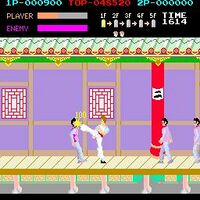
Kung Fu is basically just Chinese break dancing. The technique to get people on the floor is that you got them so bored they fall into an irreversible coma. Besides fighting techniques, it comprises several philosophical concepts to enable students to become stuntmen. During their 55-year-long rigorous training, they learn to make their limbs swoosh dramatically with even the slightest movement and then mind bullets telekinesis.
In contrast to the rest of the world, all Chinese are born with perfect Kung Fu skills. Before the communist revolution China's government was a duelocracy with all important matters settled with high flying, high drama fights. Important government positions were filled by people who could beat up the former holders of those positions. While the system was free from bureaucracy, corruption and excess it was hard on the furniture, walls and almost anything made of wood. During a heated debate on economic policy parliament collapsed (literally) when Minister Yu Wen used his Iron Pillar Standing on Cloud attack to send Vice-minister Gen Fang through the building's last load bearing wall. This led to discontent cumulating in Chairman Mao's "this is why can't we have nice things" rally in 1936.
Kung Fu was introduced to America during the latter days of the Wild West by Master Kwai Chang Caine, who changed his name to "David Carradine" during his immigration proceedings. In a tragic fondue pot accident he acquired a scar on each forearm. This caused him a great deal of trouble as the especially stupid cowboys working for the Tiger and Dragon Ranch mistook him for an unusually lanky branded calf and tried to return him to the herd—or at least get a cowbell on him. Caine would Kung Fu the shit out of these guys on a weekly basis for nearly three seasons (and later in syndication) and, as a joke, snatch their pebbles. This plague of monk-on-cowboy violence eventually brought an end to the old west lifestyle. That's why you don't see too many cowboys around any more.
Many decades later a perfect balance of cowboy and fighting monk would be synthesized by Texas A&M but it was too late.
History[edit | edit source]
The founder of Kung Fu was Asia's first global Emperor, King Fu (ca. 22050–4096 B.C.), who tailored the sport and craft in order to impress American immigrants. Failing to adopt the rich complexity of the Chinese language, Americans to this day usually misspell Kung Fu (lower case and hyphenated), even in the major dojos of Hollywood and the White House.
What is now considered Kung Fu is a modern variation of it, which Chinese would-be immigrants developed to get Americans and Canadians to like them enough to allow them to immigrate for other purposes than to be sent to death in railway construction with beyond-hazardous working conditions. With the display of Kung Fu, white people were amused and decided that "These Chinicles are pretty cool after all!" Suddenly the majority of white people decided that the Chinese would be included on the list of minorities to be exempt from lynching and that they would even consider it a taboo to refer to Chinese people using racial slurs.
By the late 20th century Kung Fu had been popularized in North American Cinema, allowing Chinese people to become highly successful and even wealthy—without any such conspiracy theories as explain the possibility of a successful Jew. Besides, as most racists put it, "Who else gonna do all 'at stuff?"
The legend (unconfirmed)[edit | edit source]
The legend of Zen, "the first master of Zen Fu, who was a master of Zen and had the title of Zen Master", is an ancient Chinese tale from the Chinese province of Zen. It was originally written by monks using the (now defunct) traditional script, and for countless generations has been passed on by the traditional art of painting pandas.
It goes that an early master of Kung Fu was legendary Zen master Zen, who came from India to China around 600 AD being sick of lousy curry and with desire for more shrimp-fried-rice and Chinese women. Fed up with sexual repression and those interminable behavior protocols one has to go through in order to score with Indian chicks, he found the perspective of becoming a stuntman much more appealing.
After having a dysfunctional experience with Emperor Wu's insufferable court of eunuchs, he was forced to flee to the hills. He found a cave where he proceeded to sit facing a wall for nine years. Legend has it that one day a young man named Hui Neng Fong Wai Yu So Fat Et Lon Fuk Yu Choi Buck Kum-Bum Shrimp Fried Rice approached him and demanded to be accepted as a student. At first, Zen Master Zen was not interested, as he was too engrossed in determining the future (via his advanced mental powers)—that being, mainly, the business possibilities connected to the future of Kung Fu. At the precise moment Zen Master Zen realized that a future incarnation of his would be the Green Hornet, and that Kato (none other than Bruce Lee himself) was to be his student, Hui Neng Fong Wai Yu So Fat Et Lon Fuk Yu Choi Buck Kum-Bum Shrimp Fried Rice suddenly chopped off his hand and threw it in Zen Master Zen's lap.
- "Ah," intoned the Zen master Zen, "you have finally come! All my life I've waited for someone with such dedication!"
- "Never mind," grimaced Hui Neng. "Just teach me already before I bleed to death."
Zen Master Zen set about teaching the eager young one-handed man and soon found him to be a man of immense natural talent; for example, the legend says that he knew how to scream KiYahaaa! while contorting one side of his face up by heart and the sound of his voice almost never dubbed up to his lip movement. Zen Master Zen proceeded to teach him the ancient arts of combat he had learned in India. This combat actually derived from Buddhist monks fighting off India's giant malaria ridden mosquitoes. In the course of flailing at them, they soon discovered how to hit the bastards most quickly and efficiently. They learned how to make drop kicks, roundhouse kicks, sidekicks, Chow Mein, wraps, sweet and sour chicken, cream of Sum Yung Guy soup and shrimp fried rice besides a plethora of other, even more secret and sinister techniques.
The saga concludes that Hui Neng carried on the torch of his old master. He is prophesized to reincarnate after 1400 years under the name of Uma Thua Man, where his mission will be to kill the first guy to cross his path who is called either "Zen" or "Bill" (but not both) and transmutate to the higher level of existence as Gay Jinn afterwards.
Ranking[edit | edit source]
Similar to karate's dan (colorful belt) rankings, levels of Kung Fu training are expressed by both the length and the whiteness of the practitioner's beard.
Some charlatans may try to pose as Kung Fu masters or grandmasters through the usage of a false beard. If there is any doubt, tug the beard firmly. If the beard slips off the imitator will be exposed as a false Kung Fu master and suitably punished by the authorities. If you get swiftly kicked to a bloody pulp by someone with a still firmly attached beard you can be assured that you are in the presence of a true Kung Fu master.
The nine (or so) styles of Kung Fu[edit | edit source]
All Kung Fu styles were developed after studying the movements of animals and have animal names. The techniques are passed down from master to master in secret manuals that consist mainly of pictures of animals. The ability to decipher a complex fighting system from animal pictures is indicative (like the beard) of a true master.
It's sort of like one of those magic eye things if they could give you the ability to tear a man's spleen out with your bare hands.
Drunken Monkey[edit | edit source]
Noticing that people fight pretty well when drunk, yet lose the ability to use all but the most basic motor skills, Master Hu-Flung-Pu began studies involving lab monkeys and alcohol. Rigorously tested and refined, his style combines the blind rage of a monkey with the blind rage of an alcoholic step-dad. Its double-blind nature makes it the most scientific of Kung Fu styles. It relies mainly on agility, opposable thumbs and prehensile toes.
Instead of a standard lesson plan it is taught in a twelve-step program.
There are two rival schools of thought about this Kung Fu style. It must either be learned drunk and practiced sober or learned sober and practiced drunk depending on who you ask and how sober they are when you ask them.
Tiger[edit | edit source]
The most traditional Kung Fu style is instantly recognized by its stance. Unfortunately, in modern times the tiger stance has been too easy to confuse with the pervert-about-to-squeeze-your-boobs attack. This has led to overuse of the boot-to-the-groin counterattack, for which there is no defense in traditional Kung Fu styles. The inability of many Tiger Style grandmasters to procreate has led to shortage in children to inherit their father's Kung Fu knowledge. If this trend continues Crouching Tiger Style Kung Fu may be put on the endangered list.
Roy of Siegfried & Roy was hospitalized by an unknown master of Crouching Tiger Style Kung Fu. His lover is currently searching for a long-bearded master somewhere in Asia in hopes of avenging him.
Crouching Tiger Style Kung Fu relies mainly on knees and uppercuts; also scratching and crouching, as well as not fucking with the Wu Tang Clan.
Kangaroo[edit | edit source]
Kangaroo Kung Fu is the only style native to Australia. Master Steve Irwin was inspired by marsupials and Australian Rules Football and decided to create a martial art out of it making it fucking hardcore. Unlike Drunken Monkey Kung Fu, it is both learned and practiced while drunk.
As shown in the illustration to the right a common technique in Kangaroo Style Kung Fu is to distract your opponent with a levitating camera, then sucker punching them.
Rumors of an Australian Drop Bear Style of Kung Fu have been disproved by the fact that not everyone in the world has been "kung-fued" to death. Such a style, if it did exist, would be unstoppable.
Dragon Fist[edit | edit source]
Dragon Fist Style was actually developed by observing dragons. Muthafuckin' dragons! Can you believe it? Just looking at a dragon funny is a good way to get your face breath-weaponed off.
Common theory is that once there was this guy who was totally bad-ass that wanted to be more bad-ass but couldn't find a way because he thought he found the upper limit of bad-assness. Luckily this made him so bad ass that he could just follow dragons all day until he knew enough about their moves to develop a style of Kung Fu based on dragons. This guy probably had an eye patch and played bass guitar.
Dragon Fist Style concentrates on right arm beefiness, acting like a bad-ass and breathing fire. Recent developments in this ancient art include the dreaded stompa-stompa-squish technique and the razor wing-a-ling cutting technique. Only those with wings may execute the latter, but the former is relatively easy to learn. Although easy to learn, the technique requires the practitioner to eat at Carl's Jr. every day until the optimum weight of 375 lbs has been achieved. More weight is preferable, but 375 lbs works for most people. If you don't like Carl's Jr., don't worry. You can eat at Denny's, too. Once you're large enough, simply stomp on your opponent's head repeatedly. Be forewarned that wearing plushy slippers may render this technique useless.
Cat[edit | edit source]
The secret of Cat Style Kung Fu is to be like a cat, completely random and unpredictable. First be pleasant and cute, then claw them, then be affectionate, then lunge for the jugular and so on. This reflects the cat's unstable temperament as well as its habit of playing with its adversary. Masters of Cat Style Kung Fu can make a lethal attack last months or even years without their target knowing or suspecting they're being killed.
For this reason it's informally known as "Girlfriend Fu".
Horse[edit | edit source]
Horse Style Kung Fu was developed during the late Qin Dynasty as a form of Kung Fu that could be used while on horseback. As you might guess, this was a colossally stupid undertaking that caused Qin horsemen to be obliterated by proper cavalry armed with the reach advantage of lances, swords, spears and arrows.
After the sudden fall of the Qin Dynasty the technique was refined by retired horsemen during the Han dynasty. Slowly and systematically they eliminated the technique's major shortcomings.
First, the problem of height: Attacking infantry with Horse Style Kung Fu was difficult because you'd have to lean over to punch them, but then you'd have to let go of the bridle and the horse you were riding would roam off in a random direction, away from battle. Kicking was equally problematic . You couldn't get much acceleration since the horse between your thighs got in the way and if you kicked too hard it would take that as a signal to charge, again taking you rapidly away from the battle. Don't even get me started on head-butting problems.
Different solutions such as riding the horses in trenches, sawing your horse's legs off, riding small, thin horses and riding large dogs were tried before the horse was abandoned from Horse Style Kung Fu entirely.
The second problem, overcoming the reach advantage of enemy swords and pole arms was solved by only starting fights with unarmed people. The first person ever to perform this magnificent trick was the man the myth the legend ... Jackie Chan, with Chris Tucker in the film Rush Hour 2!
The third problem, the sudden lack of horses in Horse Style Kung Fu, was solved by wearing horse masks while training (see above diagram) and pretending that Horse Style Kung Fu never involved horses in the first place.
Flying Bear[edit | edit source]
The basic premise of Flying Bear Style is to fly exactly the way a bear does not fly. Legend has it that an ancient master of normal Bear Style Kung Fu observed two bears not flying and thought "If I could do something completely unlike that, my Kung Fu would be unstoppable."
Back then normal Bear Style Kung Fu was gaining popularity because people figured "Hey, bears can slap the shit out of anyone, therefore any bear-based Kung Fu must be good." The flaw in this theory is that bears depend primarily on being: A) very large, and B) bears when they fight. Humans fighting in the style of bears faced a significant disadvantage. The missing ingredient in making normal Bear Style Kung Fu a viable fighting technique is to make up for the user's non-bear shortcomings by displaying aerial prowess in a manner opposite that of a bear, that is to say not at all.
Flying Bare Style Kung Fu is not a recognized style in any respectable dojo, competitive organization or hidden mountain temple. Keep your pants the hell on.
Famous masters of Flying Bear Style Kung Fu are; Winnie the Pooh, Kung Fu Panda, Baloo (from Jungle Book—you know the one, yeah, that one), that bear from Dr. Dolittle, Chuck Norris, Genghis Khan, The Rock (who is half bear), Jimmy from South Park, every current and former member of the US Marine Corps since its founding in 238 B.C., George bush, Adam & the Ants, and Oscar Wilde. The last three will fiercely oppose this truth, so don't believe them, as they are sworn to secrecy by Winnie the Pooh (current chairman of the IUFBSKFGFOTW or the International Universal Flying Bear Style Kung Fu Global Federation Of The World) lest they face a beating from his junior subject, Anne Widdecombe, who is due to undergo her licensing test in August. Don't ask Winnie either; he was sworn to secrecy by his boss, Bruce Lee.
To Fu[edit | edit source]
To Fu is a modern Kung Fu style that can be learned only through an exclusive set of mail-order cassette tapes.
“Don’t get set into one form; adapt it, build your own, and let it grow. Like tofu. Empty your mind; be formless but jiggly and a little firm on the outside—like tofu. Now when you put tofu in a curry, it tastes like the curry. When you put tofu into teriyaki sauce it tastes like the teriyaki. When you put it in an empty yogurt cup it becomes a good way to fool your friends who are thinking they’ll be eating delicious yogurt, but it’s just plain tofu which tastes sort of weird if you don’t add any spices or flavoring to it. Tofu can squish or it can bounce. Be tofu, my friend.”
– Bruce Lee: Learn the Art of To Fu in Twelve Easy Lessons (tape 1, introduction)
By developing a fighting style that's bland but healthy, versatile and highly adaptable to its surroundings the To Fu master is ready for anything. With the addition of proper ingredients To Fu can resemble other animal styles though its lack of solidity gives it away as an ersatz replacement.
A student who masters all of the techniques, To Fu being the last and most difficult, is given the title of "Royal Lard of the Chinese Empire" during a ceremony staged by a complete Bollywood movie cast, this guy and five million donkeys with typewriters singing the national anthem of the People's Republic of China. He is then allowed to wear full Kung Fu master regalia including a saffron-colored Chinese Cheese and a T‑shirt of Bob.
Notice how they skillfully pretend to not care for the ball.
Wo Fu[edit | edit source]
Invented by skilled angry women who beat their husbands senseless during the week end, Wo Fu is practiced in large gladiator pits covererd with grass, and with a giant gag ball. Said ball is a symbolic representation of the woman dominance over the sissy, and practitioners must fight over it as proof of their superiority on their peers. A referee is present to update the contestants scores, delivering colored cards to reward points. A yellow card signal things like an average sucker-punch-style-kung-fu-arm-chop, while a red card reward an expert ground-drilling with the face of your adversary.
See also[edit | edit source]
- Baby Fu
- Buddha
- Chinese ideography
- Hong Kong
- IK+
- Jackie Chan
- Jet Li
- Keanu Reeves
- Kings of Leon
- Ninja
- Ninja Gaijin
Sources[edit | edit source]
- Online portal to the world of American Kung Fu (run by the Chinese government)
- Learn how to break through stuff
- Kung Fu infant prodigy
